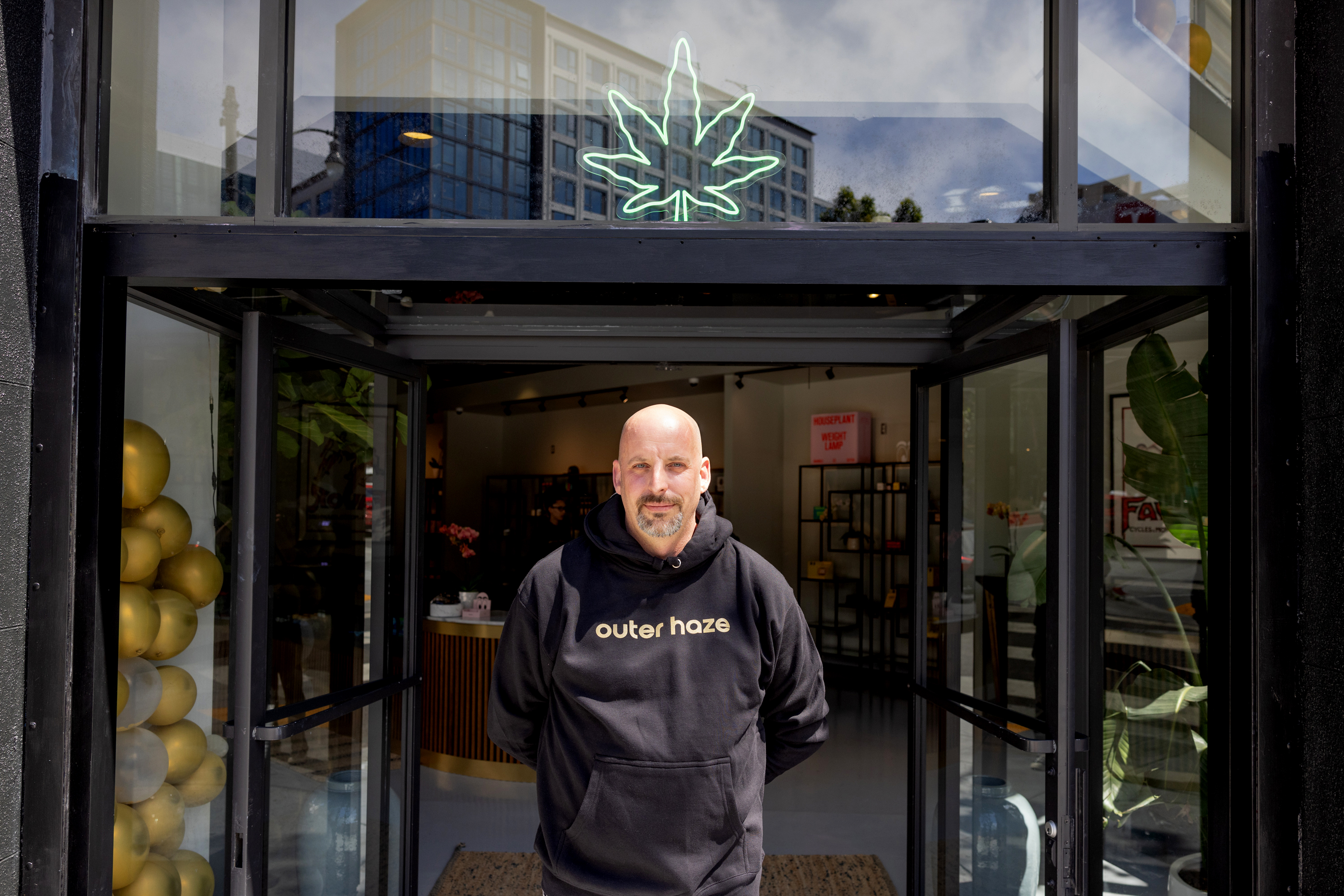Outer Haze Dispensary’s grand opening on July 23 in a former Sprint store at 928 Van Ness Ave. in San Francisco featured a DJ spinning beats, deals and discounts for new customers, and even a station making cannabis root beer floats.
For owner Chris Callaway, it was a celebration more than two years in the making. But the event also marked a different milestone for the local industry: the day when the city’s moratorium on new cannabis retail businesses went into effect.
Passed unanimously by the Board of Supervisors in June in an effort to protect existing businesses, the law prohibits new cannabis businesses citywide until 2028.
“As the city is shutting down new dispensary applications, I think we should be celebrating the ones that are still taking these vacant storefronts, activating them, and turning them into something new,” Callaway said.
Outer Haze’s opening is a bright spot on a beleaguered commercial corridor still recovering from a years-long transit project that hampered foot traffic, as well as the lingering effects of the pandemic.
There are about 30 licensed medical cannabis dispensaries and 30 adult-use retailers citywide, with 120 adult-use retail applications in process. Applicants who were able to submit materials prior to July 23 were not affected by the ban.
Still, the moratorium’s deadline kicked Callaway’s plans into high gear. He quickly found an additional Downtown location at 326 Kearny St. and worked with the landlord to complete the necessary paperwork. Callaway also has an additional pending application for a dispensary in Hayes Valley.
Previously, Callaway operated the High Road Bike Co., a bike shop in Hayes Valley, that closed in May because of weather challenges and break-ins. To him, the dispensary represents a new beginning and a chance to fulfill a long-held dream. Future plans for Outer Haze include a cannabis consumption lounge and cannabis cultivation in the basement that will be viewable through glass sections of the floor.
But success is far from assured in a city where existing businesses dedicated to helping people get high wrestle with high debt, high costs, high taxes and high property crime instead.
The prolonged planning and conditional use process for such businesses often means years of paying rent and construction costs that bar many equity participants—those hurt by decades of cannabis prohibition—from actually opening up their stores.
Callaway said he avoided the debt trap by relying on around $150,000 in local and state equity grant funds; because of a prior cannabis conviction, he was eligible for San Francisco’s Cannabis Equity Program intended to help underserved entrepreneurs and those impacted by the War on Drugs
“Obviously a little bit bittersweet because I know it does raise the value of my dispensaries and creates less competition,” Callaway said of the moratorium. “But at the end of the day, I am just more concerned with people in the program who may not have been given an opportunity to open their own retail store.”
Dispensaries’ Uncertain Future
Among longtime operators, however, the moratorium has wide support amid declining sales compared to the cannabis gold rush of just a few years prior. Some, like Kevin Reed, the owner of Green Cross, said the city should do more to protect longstanding operators.
In a May letter sent to the Board of Supervisors, Reed expressed support for the moratorium as well as for policies like alternative banking solutions and financial aid, to make up for the lack of tax deductions available because of the federal government’s prohibition on marijuana sales. It also called for a permanent suspension of a local cannabis tax that has been delayed by lawmakers three separate times.
Al Shawa, the owner of a number of cannabis dispensaries around the city, said that other than a few bright spots like the Dead & Company farewell tour held at Oracle Park earlier this month, it’s been hard to feel optimistic about the future of the local cannabis industry.
Another consistent complaint is the lack of enforcement of illegal cannabis sales on the city’s streets. Shawa said he was recently walking through the Mission District with a city official when they saw a person sitting on the sidewalk with a plastic bag full of cannabis and a scale. The person, Shawa said, was siphoning sales from his business as well as a neighboring dispensary.
“The market is overcrowded and oversaturated. We recently had the moratorium go into effect,” Shawa said. “It’s a little late, but it’s a step in the right direction.”
One step in the wrong direction for cannabis operators, however, is the change in California’s cannabis tax code that shifted the burden for collecting and paying the 15% cannabis excise tax from distributors to retailers. If they fail to pay every quarter, their tax bill rolls over to the next quarter—with a 50% surcharge for lateness.
That adds an additional burden for businesses that have accumulated thousands of dollars in debt. The first round of these payments was due in May. As of May 16, California tax officials report around $278 million in total outstanding unpaid state cannabis taxes since legalization went into effect.
Shawa said he’s been getting calls from fellow dispensary owners asking him to take over their business for little to nothing, provided that he assumes their tax liability.
So far, he hasn’t taken them up on their offers.
